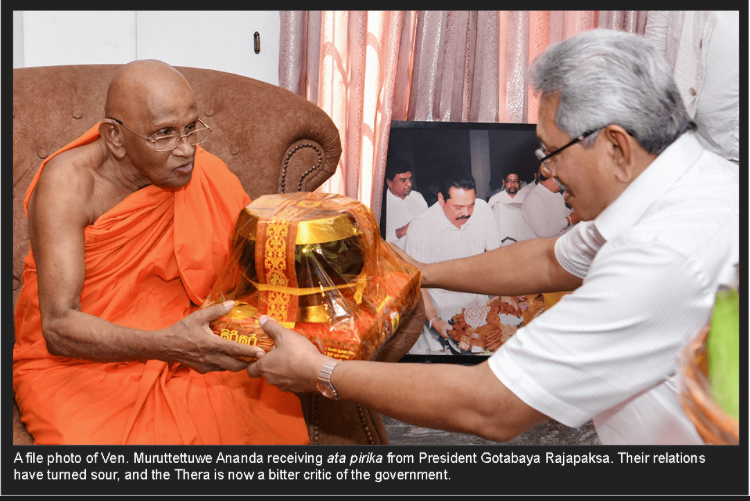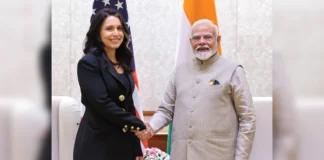The first round of the All-Party Conference (APC) on the economic crisis has been held without the participation of the SJB and the JVP. President Gotabaya Rajapaksa on Wednesday (23) struck a conciliatory note, and was seen to be making a serious effort to enlist the support of the Opposition although the first APC session was not free from acrimony. Finance Minister Basil Rajapaksa and UNP leader and former Prime Minister Ranil Wickremesinghe had a heated argument over the IMF report, which has since been released. About a year, whoever would have thought the SLPP government, which was flaunting its power and riding roughshod over its political rivals, would ever have to powwow with the Opposition?
Every politician’s dream is to acquire untrammeled state power to control others and further his or her interests. Politicians therefore pull out all the stops to obtain huge parliamentary majorities, and succeed in their endeavor at times. There have been four such instances in the post-Independence era in this country. The SLFP-led United Front government secured a two-thirds majority in 1970; the UNP obtained a five-sixths majority in 1977; the UPFA mustered a two-thirds majority with crossovers in 2010, and the SLPP did likewise in 2020.
The incumbent SLPP administration may have thought that it, too, would be able to bulldoze its way through just like its predecessors with thumping majorities, but it finds itself in such a situation that it has had to seek the support of the Opposition.
Economic crisis
The government would have us believe that the country’s current predicament is solely due to the Covid-19 pandemic, which has had a crippling impact on the economy. If so, all others should be facing the same problems because the pandemic has not spared any part of the world. India is one of the worst-affected countries, but its economy is growing, and the ruling BJP continues to win elections handsomely. Bangladesh has also absorbed the Covid-19 shocks remarkably well, and its economy is in relatively good shape. None of the countries in Asia is on the verge of bankruptcy because of the pandemic.
Sri Lanka’s present crisis is mostly due to debt-related issues which have gone unattended for decades. The situation took a turn for the worse owing to the pandemic, the present administration’s poor economic management, procrastination, and expensive vote-catching relief measures. The SLPP, which captured power in the parliament after securing the presidency in 1999, introduced a wide range of tax cuts, depriving the state coffers of a great deal of revenue in the process. It also threw around a lot of public money by way of pandemic relief to win the 2020 general election.
The SLPP did not care to mend its way even after being elected in 2020. It took the steep drop in the foreign currency inflow for granted without taking action to restrict imports. The only meaningful measure it adopted to curtail the outflow of forex was to stop vehicle imports. If it had not dillydallied on seeking IMF assistance, curtailing state expenditure, restricting imports and floating the rupee, the economic crisis could have been managed. Now, the government cannot negotiate with the IMF from a position of strength, and will have to agree to some constricting conditions, which will entail a political fallout.
Political crisis
A government with a huge parliamentary majority is believed to be able to bring about political stability, but there are exceptions to the rule. Political instability invariably sets in when the national economy experiences a decline, and the ruling party/coalition happens to be plagued by internal disputes. Today, Sri Lanka is experiencing a double whammy—it is facing serious problems on both economic and political fronts. While the economic crisis is worsening, the government is experiencing a debilitating intraparty conflict, and the Opposition has chosen to go on the offensive.
The present administration would have been able to overcome problems on the political front if the economy had been doing well without people undergoing hardships. Instead of trying to make peace with the warring dissidents, the SLPP is trying to win over only the SLFP, which has 14 MPs in the government parliamentary group.
The reason the JVP and the SJB have given for boycotting the APC is that the government’s intentions are not genuine; they insist that it has sought to solve its internal problems by acceding to the SLFP’s request for a coming together of all political parties. These two parties seem to have read the situation accurately. The government is trying to kill several birds with one stone where the APC is concerned. It wants to keep the SLFP happy by granting its request in a bid to create a split in the SPP dissident group, prevent the Opposition from holding mass protests to tap pent-up public anger to power its anti-government campaign; it is also trying to involve all parties in the task of salvaging the economy so that all of them will have to share the blame in case of failure, and nobody will be able to gain political mileage out of it. Hence the SJB and the JVP have boycotted the APC and are staging public protests to gain the much-needed political traction.
The SLPP dissidents have also chosen to step up their campaign against the government, and this must be a worrisome proposition for the SJB and the JVP because the frustrated SLPP supporters will now have an alternative in the form of the SLPP rebel group, which is sure to contest future elections separately.
Dissidents’ to bring down the government.
The SLPP dissidents, led by former Ministers Wimal Weerawansa and Udaya Gammapila, and Minister Vasudeva Nanayakkara met the Mahanayake Theras in Kandy on Thursday and Saturday to brief the prelates on the political situation, and hand over their policy programme, Rata Hari Magata or ‘Country in the right direction’ to them. They repeated the allegations they have been making all these months, the main being that the government is ruining the economy deliberately to make the country dependent on the western nations so as to further their personal interests.
Weerawansa, told the media, after meeting the Maha Nayake Theras, that they were on a campaign to end the family rule and save the country. The SLPP dissidents have been saying of late that the government will lose its parliamentary majority. But, the SLPP alone has more than 125 seats in the parliament, and several Opposition MPs have crossed over to the government. Therefore, it may be able to have a comfortable majority even if the rebel group leaves it, provided some of its own MPs do not defect. The dissidents claim to have 30 MPs on their side.
President Mahinda Rajapaksa’s government (2010-2015) also had a two-thirds majority and the SLFP MPs in it numbered more than 130, but it collapsed due to mass crossovers, which led to the defeat of President Rajapaksa in the 2015 presidential race. There was no economic crisis at that time and the people were not lining up to buy essentials. The current government is in a far worse situation.
Buddhist monks turn against the government
Buddhist monks played a pivotal role in bringing about the 2019 regime change. The Rajapaksas launched their campaign against the yahapalana government from Abayaramaya Temple in Narahenpita in 2015. Chief incumbent of the temple, Ven. Muruttettuwe Ananda, was instrumental in drumming up the support of Buddhist monks and the public for the Joint Opposition (the rebel faction of the SLFP-led UPFA). Abayaramaya backed former President Mahinda Rajapaksa to such an extent that the then Prime Minister would mockingly call it ‘Mahindaramaya’.
Most of the prominent Buddhist monks who supported the SLPP are now disillusioned with the present government. Ven. Ananda is among them, and he was shown on Hiru TV on Saturday (26) calling on the government to grant people relief, straighten up the economy and give Basil Rajapaksa some other ministry, implying that he should be removed as the Finance Minister. He said a large number of Buddhist monks would gather at Abayaramaya next week to make some vital decisions. He did not say what the decisions would be about, but speculation is rife in political circles that the monks will issue an ultimatum to the government.
Fickle majorities
Popular majorities that presidential candidates and political parties secure are fickle, and become ineffectual with the passage of time unless reinforced from time to time. Presidents and ruling parties have to work hard to retain popular support by developing the economy and solving problems the people are beset with while maintaining intraparty unity.
The SLPP government has neither managed the economy well nor made a serious attempt to keep its coalition allies together. It has therefore become weak and vulnerable despite its numerical strength in the parliament. People, mostly those who voted for the President and the SLPP, are cursing the government in the streets, where they are waiting in long queues to buy essentials, and the dissident SLPP MPs are on a campaign to engineer a regime change. The government could not have been in a worse situation, and whether it will be able to wriggle out of this politico-economic mire remains to be seen.



 Logging you in...
Logging you in... Loading IntenseDebate Comments...
Loading IntenseDebate Comments...

